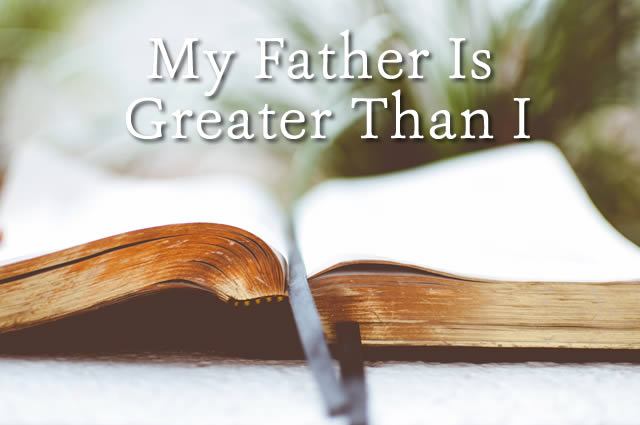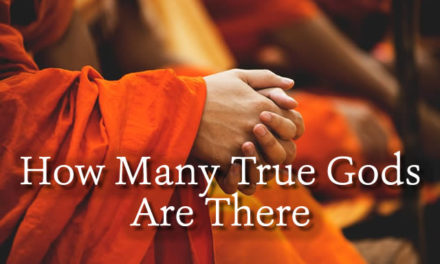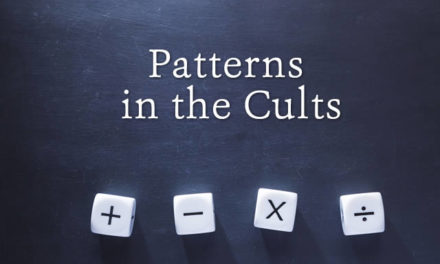John 14:28: My Father Is Greater Than I
“…If you loved me, you would rejoice, because I said, I go unto the Father: for my Father is greater than I.” John 14:28b
This is another of the four most common proof texts used by the Watchtower Society to disprove the deity of Christ. The other three texts are;
Proverbs 8:22 “The LORD possessed me in the beginning of his way, before his works of old.” The Watchtower’s New World Translation says, “produced me.” Their point is that wisdom, i.e., Jesus, was produced or created and therefore cannot be eternal.
Colossians 1:15 “Who is the image of the invisible God, the firstborn of every creature.” The Watchtower defines “firstborn” as first created. Therefore Jesus is a created being and not God.
Revelation 3:14 “…the beginning of the creation of God.” Again, the Society says this proves Jesus was created.
The Watchtower Society and Jehovah’s Witnesses are refuted on each of these verses in past articles of the News & Views. See Volumes/Number 6/10, 9/11, and 10/3.
John 14:28 is probably the most commonly used verse by a Jehovah’s Witness at the door when they meet a Christian who tries to defend the deity of Christ. The JW at the door will say something like this, “How could Jesus be equal with Jehovah when he said, ‘My Father is greater than I?” That will usually send the Christian in one of two directions, retreat to something like the “I don’t want to argue” position, or, some attempt at explaining the simultaneous equality with God and the positional subordination of the Son. That explanation usually goes right over the head of the Witness because they do not understand the definition of the Trinity much less the two natures of Christ.
The goal for the Christian is to not be put on the defensive. Therefore, I will explain how to parry their John 14:28 thrust and regain the initiative in the discussion.
Why Jehovah’s Witnesses Misunderstand
The Witness has been programmed by the Society to think of the Trinity as “three gods in one” and to think of Jesus as merely a man, though perfect like Adam before the Fall, while on earth. The misunderstanding becomes a communication problem when a Christian tries to say Jesus is God. The Witness will think that cannot be true because there is only one God, i.e., the Father (Jehovah), and Jesus is His Son. So how can Jesus be his own father? This is why John 14:28 makes sense to them as do the other proof texts they cite to disprove Jesus deity.
To overcome this programming you must do three things. First, give a proper definition of the Trinity, and Two, give a proper interpretation of the verses they cite against Jesus’ deity. Then the Third step is to show clear proof that Jesus is called God in the Bible. This last step sets up a logical contradiction in their mind. If John 14:28 shows Jesus is not God but John 20:28 shows that He is God, then does scripture contradict? Or, is there some other explanation such as the Trinity?
Step One: Define the Trinity
The Trinity is properly defined as three Persons in one God. Each Person is equal in nature, eternity, and power. The three Persons are distinct from one another. To illustrate the distinction of Persons take the case of Jesus’ baptism. The Father is in heaven speaking, the Son is in the water being baptized and the Holy Spirit is in the form of a dove descending on Jesus. One clear conclusion from this is that Jesus is not the Father, and the three Persons are distinct from one another.
The definition that has confused the Witnesses is the modalistic definition, also known as Jesus Only, where there is just one Person in the Godhead Who is at one time the Father, but at another time He is the Son, and then later is the Holy Spirit. The United Pentecostal and Apostolic groups hold this definition. It was rejected early in Church history. You must inform the Witness that such a definition is not, nor has it ever been, a proper definition of the Trinity.
The Athanasian Creed provides good definitional statements on the Trinity. With my comments in parenthesis it says, “For we worship one God in trinity, and trinity in unity. Neither confounding the Persons (saying Jesus is the Father) nor dividing the substance (saying there are three Gods). For the Person of the Father is one; of the Son, another; of the Holy Spirit, another. But the divinity (divine nature) of the Father, and of the Son, and of the Holy Spirit, is one, the glory equal, the majesty equal… Thus the Father is God, the Son, God, and the Holy Spirit, God. And yet there are not three Gods, but one God only… For we are compelled by Christian truth to confess each person distinctively to be both God and Lord. We are prohibited by the Catholic (Universal) religion to say that there are three Gods, or three Lords.”
Another line of reasoning is to show that each of the Persons of the Trinity is called God in an absolute sense, but the Bible also teaches just one true God. Deuteronomy 6:4 says there is only one God. There will be no disagreement that the Father is called God. The Son is called God in an absolute sense in John 1:1 and John 20:28. The Holy Spirit is called God in Acts 5:3,4 and 2 Corinthians 3:17. For further information on this you may request our pamphlet The Trinity and a $1 donation for postage.
To help the Witness comprehend the concept of three in one you can use analogies such as those described in the News & Views Vol. 8, Number 11 (2006). An example from that article is the Universe. It is made up of three parts, Time, Space, and Matter. However, each of these parts is also triune. Time is past, present, and future. Space is length, depth, and width. Matter is energy, motion, and phenomenon or substance. So why can God not be Triune but He created His Universe that way?
Step Two: Interpreting John 14:28
One of the most common problems heretics get into is isolating texts from the larger context of scripture. Taken by itself this verse would seen to back up what the Watchtower says. However, in the same context of John’s Gospel Jesus says “I and the Father are one” (10:30). John also says of Jesus that “the Word was God” (1:1) and records Thomas confession of “My Lord and my God” (20:28).
Putting 14:28 in its proper context requires an understanding AND acceptance of the Trinity. There is no other way to reconcile this verse, and others like it. Jesus as the Second Person of the Trinity has a position lower than the Father just as a human son is in a position lower than his father. Both God the Father and Jesus the Son are equal in their divine nature. A human father and son are also equal in their human nature.
An important distinction to make is that while Jesus was on earth He was also a man. As a man he had a God just like His disciples. An example is John 20:17. There are two categories of verses in regard to Jesus. First, He is the Son of God (deity), and second, He is the Son of Man (humanity). Sometimes a text is discussing Jesus in the context of humanity and sometimes in the context of His deity. That distinction must first be identified before a text can be interpreted. John 14:28 clearly discusses a positional distinction between the Father and Son. It is not discussing Jesus’ nature.
An evidence for this distinction between nature and position is in the choice of words within the verse itself. When John quotes Jesus as saying “My Father is greater…” the Greek word for “greater” is meizon, meaning a positional greatness. That it means a positional greatness is demonstrated at John 13:16 and 15:20. If Jesus were just a man He would use the Greek word kreitton because it refers to a differences in natures, a higher order of being. It means ‘better than’.
Step Three: Jesus is Called God
The following scriptures are proof that the Bible teaches the full deity of Jesus. He is divine in the same sense as the Father is divine. He is in no sense a lesser deity. Nor did He lay aside His deity when He became man.
Matthew 1:23 – Jesus is called Emmanuel, meaning God with us.
John 1:1 – “the Word (Logos) was God.” Not “a god” for that would be polytheism.
John 5:17-23 – the Son is equal to His Father.
John 8:53-59 – Jesus is the “I Am” of Exodus 3:1-15.
John 10:28 – Thomas calls Jesus “My Lord and My God.” Literally “the Lord of me and the God of me.”
Romans 9:5 – Christ is God over all.
Colossians 2:9 – Jesus possesses all the fullness of deity.
Titus 2:13 – “our Great God and Savior.”
Hebrews 1:8 – “Thy throne O God.”
1 John 5:20 – “The true God.”
There are many other texts that describe Jesus in the same terms used to describe God, or the Father.
John 1:3 – Jesus is described as the creator of ALL things.
Hebrews 1:3 – Jesus is the “exact representation” of God’s very being.
Hebrews 1:6 – Jesus is worshipped by the angels.
Old Testament passages when cross-referenced with the New Testament show Jesus to be the One spoken of as God in the Old Testament.
Isaiah 40:3 with John 1:23 & 3:28 – The “voice of one crying in the wilderness” to prepare a way for our God is applied to John the Baptist and Jesus.
Isaiah 45:23 with Philippians 2:10,11 and Romans 14:11 – Every knee will bow to Jehovah/Jesus.
Psalms 102:24-27 with Hebrews 1:10-12 – Jehovah/Jesus laid the foundations of the earth.
In the Watchtower’s New World Translation they have inserted the name Jehovah in the New Testament 237 times. Their “rule” for determining where the divine name should be used is found on page 18 of their Kingdom Interlinear Translation. It says, “How is a modern translator to know or determine when to render the Greek words ‘Kyrios’ or ‘Theos’ into the divine name in his version? By determining where the inspired Christian writers have quoted from the Hebrew Scriptures. Then he must refer back to the original to locate whether the divine name appears there. This way he can determine the identity to give to ‘Kyrios’ and ‘Theos’ and he can then clothe them with personality.”
When using this “rule” with the above scriptures, the Watchtower did not follow their rule.
Early Church Fathers, speaking in the second and third centuries, were also explicit in their declaration that Jesus is God. Polycarp called Jesus “our Lord and God.” Ignatius said, “For our God, Jesus the Christ, was conceived in the womb of Mary.” (See The Early Church Fathers by Lightfoot). Irenaeus, a student of Polycarp, wrote his Five Books Against Heresies in which he defended Christian doctrine against the major heresies of the day, said that Jesus is “…our Lord, and God, and Savior, and King” (The Ante-Nicene Fathers, Vol. 1, page 330).
Conclusion
The Jehovah’s Witnesses do not have a shred of evidence to support their position of Jesus being a created being. They must twist texts out of their context to make them appear to say the opposite of what the Bible teaches. It is like a Potemkin village, a façade concealing the truth from the gullible. Grigori Potemkin, a general and Russian statesman had pretty village facades built along the Dnieper River to impress the Empress Catherine the Great while she sailed down the river to the Crimea. The villages were manned by hired peasants to look real. It was a grand deception much like the guided tour Jehovah’s Witnesses will give you through the Bible to disprove Jesus’ deity.
By David Henke






